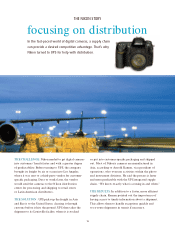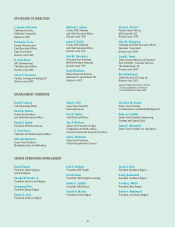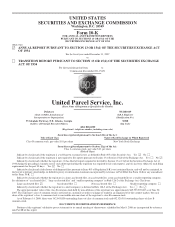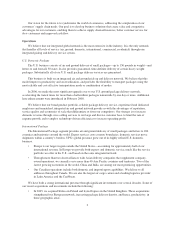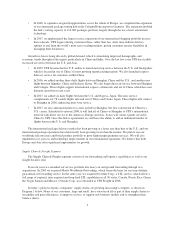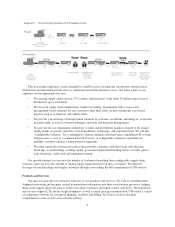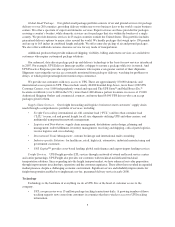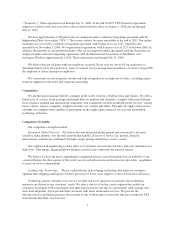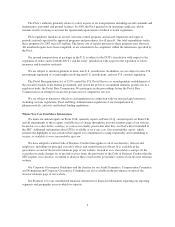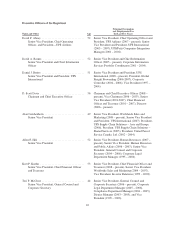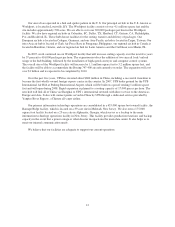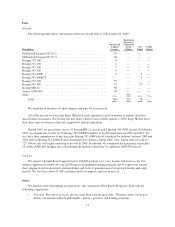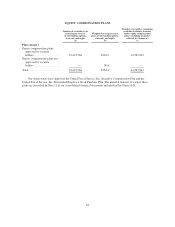UPS 2007 Annual Report Download - page 23
Download and view the complete annual report
Please find page 23 of the 2007 UPS annual report below. You can navigate through the pages in the report by either clicking on the pages listed below, or by using the keyword search tool below to find specific information within the annual report.Broad, Portfolio of Services. Our portfolio of services enables customers to choose the delivery option that
is most appropriate for their requirements. Increasingly, our customers benefit from business solutions that
integrate many UPS services in addition to package delivery. For example, our supply chain services—such as
freight forwarding, customs brokerage, order fulfillment, and returns management—help improve the efficiency
of the supply chain management process.
Customer Relationships. We focus on building and maintaining long-term customer relationships. We
serve 1.8 million pick-up customers and 6.1 million delivery customers daily. Cross-selling small package,
supply chain and freight services across our customer base is an important growth mechanism for the company.
Brand Equity. We have built a leading and trusted brand in our industry—a brand that stands for quality
service, reliability and product innovation. The distinctive appearance of our vehicles and the friendliness and
helpfulness of our drivers are major contributors to our brand equity.
Distinctive Culture. We believe that the dedication of our employees results in large part from our
distinctive “employee-owner” concept. Our employee stock ownership tradition dates from 1927, when our
founders, who believed that employee stock ownership was a vital foundation for successful business, first
offered stock to employees. To facilitate employee stock ownership, we maintain several stock-based
compensation programs.
Our long-standing policy of “promotion from within” complements our tradition of employee ownership,
and this policy reduces the need for us to hire managers and executive officers from outside UPS. The majority
of our management team began their careers as full-time or part-time hourly UPS employees, and have spent
their entire careers with us. Many of our executive officers have more than 30 years of service with UPS and
have accumulated a meaningful ownership stake in our company. Therefore, our executive officers have a strong
incentive to effectively manage UPS, which benefits all our shareowners.
Financial Strength. Our balance sheet reflects financial strength that few companies can match. As of
December 31, 2007, we had a balance of cash and marketable securities of approximately $2.604 billion and
shareowners’ equity of $12.183 billion. We carry long-term debt ratings of AA- / Aa2 from Standard & Poor’s
and Moody’s, respectively, reflecting our strong capacity to service our obligations. Our financial strength gives
us the resources to achieve global scale; to make investments in technology, transportation equipment and
buildings; to pursue strategic opportunities which will facilitate our growth; and to return value to our
shareowners in the form of increasing dividends and share repurchases.
Government Regulation
The U.S. Department of Homeland Security, through the Transportation Security Administration (“TSA”),
the U.S. Department of Transportation (“DOT”) and the Federal Aviation Administration (“FAA”), regulates air
transportation services.
The TSA regulates various security aspects of air cargo transportation in a manner consistent with the TSA
mission statement to “protect[s] the Nation’s transportation systems to ensure freedom of movement for people
and commerce.”
The DOT’s authority primarily relates to economic aspects of air transportation, such as discriminatory
pricing, non-competitive practices, interlocking relations and cooperative agreements. The DOT also regulates,
subject to the authority of the President of the United States, international routes, fares, rates and practices, and is
authorized to investigate and take action against discriminatory treatment of U.S. air carriers abroad. We are
subject to U.S. customs laws and related DOT regulations regarding the import and export of shipments to and
from the U.S. In addition, our customs brokerage entities are subject to those same laws and regulations as they
relate to the filing of documents on behalf of client importers and exporters.
8


